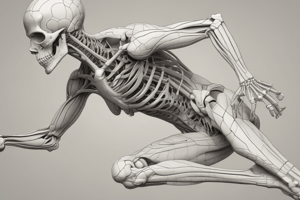Podcast
Questions and Answers
Which structure is responsible for producing synovial fluid?
Which structure is responsible for producing synovial fluid?
- Articular cartilage
- Joint cavity
- Synovial membrane (correct)
- Fibrous capsule
Which type of synovial joint allows movement in two perpendicular axes?
Which type of synovial joint allows movement in two perpendicular axes?
- Condylar joint
- Hinge joint
- Ellipsoid joint
- Saddle joint (correct)
Which type of synovial joint allows movement in only one axis?
Which type of synovial joint allows movement in only one axis?
- Hinge joint (correct)
- Condylar joint
- Saddle joint
- Ellipsoid joint
Which structure forms a protective covering around a synovial joint?
Which structure forms a protective covering around a synovial joint?
Which type of synovial joint is found at the knee joint?
Which type of synovial joint is found at the knee joint?
Which type of synovial joint allows all types of movements?
Which type of synovial joint allows all types of movements?
Which type of synovial joint has flat articular surfaces where bones slide over each other?
Which type of synovial joint has flat articular surfaces where bones slide over each other?
Which joint is an example of a non-axial synovial joint?
Which joint is an example of a non-axial synovial joint?
Flashcards
Synovial fluid producer
Synovial fluid producer
The synovial membrane produces synovial fluid, which lubricates and cushions joints.
Saddle joint movement
Saddle joint movement
A saddle joint allows movement in two perpendicular axes, like a saddle fits a horse.
Hinge joint movement
Hinge joint movement
A hinge joint permits movement in only one axis, like a door hinge.
Synovial joint covering
Synovial joint covering
Signup and view all the flashcards
Knee joint type
Knee joint type
Signup and view all the flashcards
Most mobile joint type
Most mobile joint type
Signup and view all the flashcards
Plane joint movement
Plane joint movement
Signup and view all the flashcards
Non-axial synovial joint example
Non-axial synovial joint example
Signup and view all the flashcards
2 axis joint
2 axis joint
Signup and view all the flashcards
1 axis joint
1 axis joint
Signup and view all the flashcards
Study Notes
Synovial Joints
- Synovial fluid is produced by the synovial membrane.
- A condyloid joint is a type of synovial joint that allows movement in two perpendicular axes.
- A hinge joint is a type of synovial joint that allows movement in only one axis.
- A capsule forms a protective covering around a synovial joint.
- The knee joint is an example of a hinge joint, a type of synovial joint.
- A ball-and-socket joint is a type of synovial joint that allows all types of movements.
- A plane joint is a type of synovial joint that has flat articular surfaces where bones slide over each other.
- The atlanto-axial joint is an example of a non-axial synovial joint.
Studying That Suits You
Use AI to generate personalized quizzes and flashcards to suit your learning preferences.




